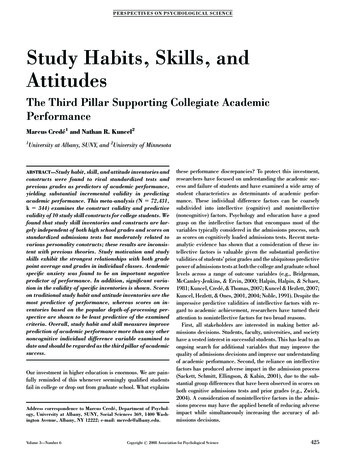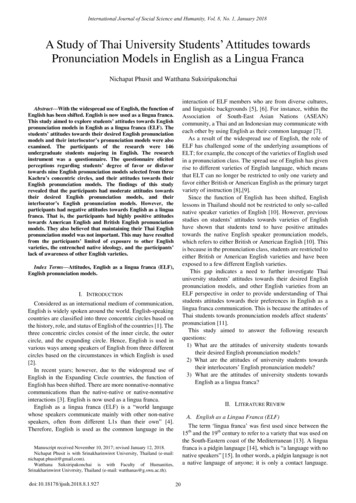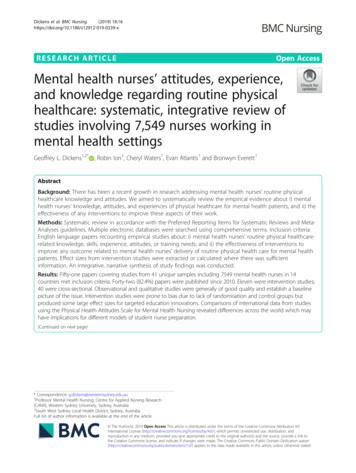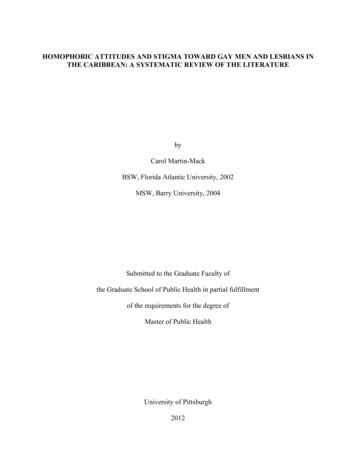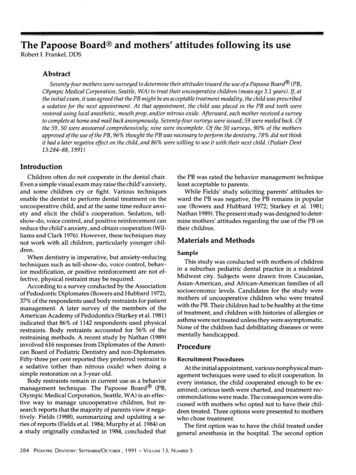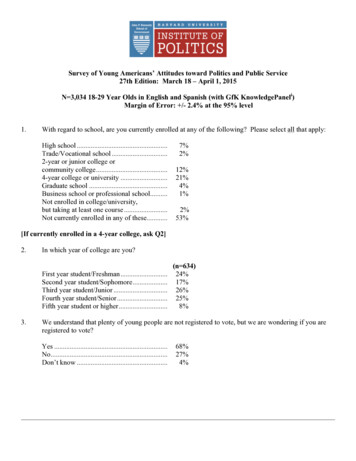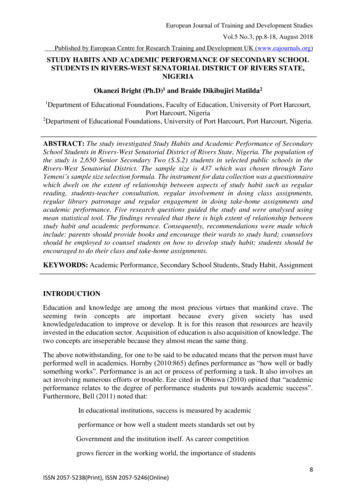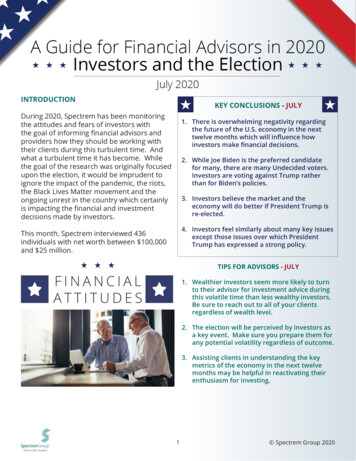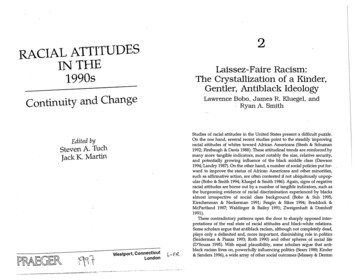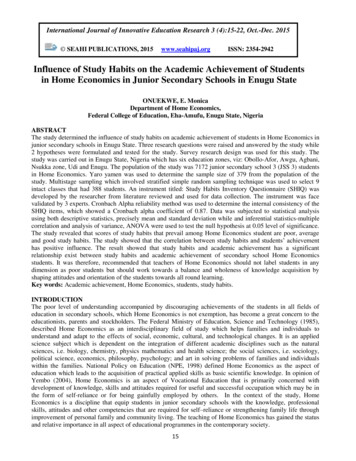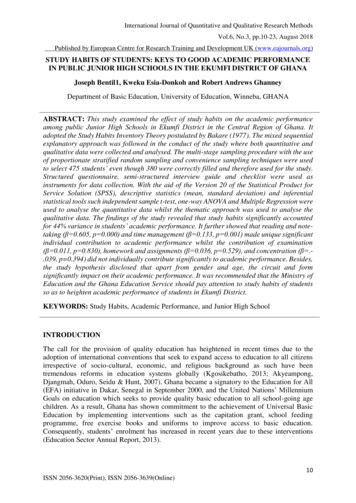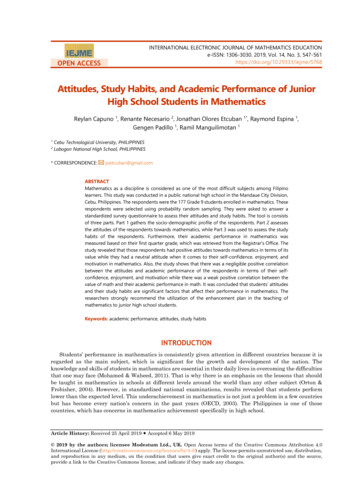
Transcription
INTERNATIONAL ELECTRONIC JOURNAL OF MATHEMATICS EDUCATIONe-ISSN: 1306-3030. 2019, Vol. 14, No. 3, 547-561https://doi.org/10.29333/iejme/5768OPEN ACCESSAttitudes, Study Habits, and Academic Performance of JuniorHigh School Students in MathematicsReylan Capuno 1, Renante Necesario 2, Jonathan Olores Etcuban 1*, Raymond Espina 1,Gengen Padillo 1, Ramil Manguilimotan 112Cebu Technological University, PHILIPPINESLabogon National High School, PHILIPPINES* ics as a discipline is considered as one of the most difficult subjects among Filipinolearners. This study was conducted in a public national high school in the Mandaue City Division,Cebu, Philippines. The respondents were the 177 Grade 9 students enrolled in mathematics. Theserespondents were selected using probability random sampling. They were asked to answer astandardized survey questionnaire to assess their attitudes and study habits. The tool is consistsof three parts. Part 1 gathers the socio-demographic profile of the respondents. Part 2 assessesthe attitudes of the respondents towards mathematics, while Part 3 was used to assess the studyhabits of the respondents. Furthermore, their academic performance in mathematics wasmeasured based on their first quarter grade, which was retrieved from the Registrar’s Office. Thestudy revealed that those respondents had positive attitudes towards mathematics in terms of itsvalue while they had a neutral attitude when it comes to their self-confidence, enjoyment, andmotivation in mathematics. Also, the study shows that there was a negligible positive correlationbetween the attitudes and academic performance of the respondents in terms of their selfconfidence, enjoyment, and motivation while there was a weak positive correlation between thevalue of math and their academic performance in math. It was concluded that students’ attitudesand their study habits are significant factors that affect their performance in mathematics. Theresearchers strongly recommend the utilization of the enhancement plan in the teaching ofmathematics to junior high school students.Keywords: academic performance, attitudes, study habitsINTRODUCTIONStudents’ performance in mathematics is consistently given attention in different countries because it isregarded as the main subject, which is significant for the growth and development of the nation. Theknowledge and skills of students in mathematics are essential in their daily lives in overcoming the difficultiesthat one may face (Mohamed & Waheed, 2011). That is why there is an emphasis on the lessons that shouldbe taught in mathematics in schools at different levels around the world than any other subject (Orton &Frobisher, 2004). However, in standardized national examinations, results revealed that students performlower than the expected level. This underachievement in mathematics is not just a problem in a few countriesbut has become every nation’s concern in the past years (OECD, 2003). The Philippines is one of thosecountries, which has concerns in mathematics achievement specifically in high school.Article History: Received 25 April 2019 Accepted 6 May 2019 2019 by the authors; licensee Modestum Ltd., UK. Open Access terms of the Creative Commons Attribution 4.0International License (http://creativecommons.org/licenses/by/4.0/) apply. The license permits unrestricted use, distribution,and reproduction in any medium, on the condition that users give exact credit to the original author(s) and the source,provide a link to the Creative Commons license, and indicate if they made any changes.
Capuno et al.Figure 1. Conceptual Framework of the StudyIn 2003, the Philippines participated in the Trends in International Mathematics and Science Study(TIMSS), the country ranked 34th in mathematics out of 38 participating countries. Moreover, in the 20162017 data, the country ranked 79th of 138 participating countries in the quality of mathematics educationaccording to the Global Competitiveness Report of the World Economic Forum. These results had beenconcretized by the Philippines’ Department of Education (DepEd) report in the National Achievement Test(NAT) on the mean percentage score (MPS) for high school was below the target performance of the students.Several studies had been conducted in different countries to determine the factors that could influence thestudents’ performance in mathematics. Of all the factors that could be studied, students’ attitudes towardsmathematics had been consistently studied because many research found a positive relationship betweenattitudes and students’ performance (Bramlett, 2007; Mohd et al., 2011; Nicolaidou & Philippou, 2003).Generally, the positive perceptions of students in learning mathematics could help develop a positive attitudetowards the subject, which will, in turn, lead to better performance. In contrast, the negative perceptions ofstudents towards the subject will also contribute to their low performance in the subject (Bayaga &Wadesango, 2014; Mahanta, 2012; Mensah et al., 2013; Thomas, 2000).On the other hand, the study habit is one of the factors that could also largely influence students’performance. If this is not given attention by the persons concerned, its effect could become more damaging tostudents’ performance (Ebele & Olofu, 2017). Students need to possess good study habits to excel in life becauseit is the study habits of the students that aid in obtaining relevant and applicable knowledge. Thus, theabsence of these skills would lead the students to poor performance in school (Kaur & Pathania, 2015).It has been observed that student’ attitudes towards learning and study habits have declined because ofthe different extra-curricular activities that the students in the public national high school in Cebu,Philippines are engaged in. They are more excited to be excused from classes when they are required byteachers to have practice for their presentations. One of the everyday activities that the students have are themonthly activities that each subject are celebrating like Nutrition Month in July, Filipino Language Month inAugust, Math and Science Month in September, United Nations in October and other similar activities. Duringeach celebration, the majority of students need to participate in the programs of the school. Some studentshave to excuse from classes because they need to practice for their presentation during the culminating activityof the celebration. In this sense, students lost their focus on their studies because they are already preoccupiedof the activities outside the four walls of the classroom.548http://www.iejme.com
INT ELECT J MATH EDMoreover, they will spend more time on their extra-curricular activities, thereby leaving their lessonsbehind. There are even times wherein students need to stay late in school because they need to practice on theevents that they are participating in. Hence, students do not have time to study their lessons at home. Sincethey are already tired in school, these students will not be able to scan their notes to check if they haveexaminations or assignments for the next day. Besides, being excused during classes will put the learning ofthe students into compromise because their opportunity to learn the lessons discussed is lost due to theirabsence during the discussions or activities provided by the teacher in the classroom. Students’ learning willhave more effect in subjects wherein knowledge on fundamental concepts are required before learning themore complicated concepts like the lessons in mathematics. When students do not acquire the necessary skillsin math, their understanding of the advanced topics will be affected. If this case were left unresolved, it wouldlead to a negative attitude towards the subject especially that most students find mathematics as a difficultsubject. Consequently, the performance of the students will be affected.Thus, it is in this premise that this study was undertaken by the researchers to assess the study habits,attitudes, and performance in mathematics of the Grade 9 students. It is the effort of the researchers todetermine the effects of these schools activities towards students’ study habits, attitudes, and performance inmathematics so that the findings of this study will be the basis for proposing an enhancement plan formathematics performance. In such a way, the vision of the DepEd in providing high-quality education in amore holistic approach will be realized without compromising the other aspects of students’ development.FRAMEWORKThis investigation is moored on the hypothesis of Affective-Cognitive Consistency Theory by Rosenberg(1968), which states that the changes in the individuals’ affective component will produce changes in ones’cognitive component so that it will bring consistency between the two components. The students’ feelingstowards the subject will affect how they perform on the subject. A student with a negative attitude towards asubject will think that he or she will not do well in the subject. However, a student with a positive attitudetowards a subject will be motivated to perform well because he or she thinks that he or she is capable ofachieving in that subject.In general, students do not like mathematics. Difficulty in understanding the subject matter and teacherrelated factors were the primary reasons why these students hate mathematics. This dislike of the subject willresult in a negative attitude towards the subject. Moreover, the students who hate the subject do not likestudying the subject. More importantly, in mathematics, wherein concepts are difficult for the students tounderstand, it is essential that their study habits should be developed. Trying to study on subjects where theyhave negative feelings will not help them improve their performance in the subject. Consequently, students’performance in mathematics will be affected because they will not have time to study the subject.Moreover, the Self-Perception Theory by Bem (1972) supports this study. The theory states thatindividuals’ actions are interpreted by the way he or she interpret others and ones’ actions are most of thetime influenced by others and not of ones’ own free will as he or she would expect. Similarly, in the case of thestudents wherein, most of them think that mathematics is a difficult subject, they will tend to have the samefeelings with others. Thus, whenever they do not understand the lessons in math, they will have the possibilityof thinking that they are not alone. So, one will justify his performance on the premise that most of thestudents do not like math because it is difficult and so he does. However, if the student feels the other way,then he would develop a positive attitude towards the subject because he can justify why he likes the subject.With these, the willingness of the student to learn the subject can help in developing good study habits on thesubject to which the student has a positive attitude. Nagaraju (as cited in Mendezabal, 2013) stressed thatpositive attitudes and good study habits are important factors in achieving good performance in school. It isexpected that students must perform well in school so that they will be able to meet the standards set byDepEd in order to be promoted to the next level. Failure to do so will result in students’ retention.However, the “No Filipino Child Left Behind Act of 2010” states that the state should protect and promotethe right of the citizens to quality education and to take appropriate steps to make such education accessibleto all. It is in this context that students should be provided with equal opportunity to learn in school. Theteachers to ensure learning inside the classroom should address whatever are the shortcomings of thestudents. Teachers have to encourage students to develop positive attitudes towards the subject they areteaching and assist in the students’ development of good study habits. Furthermore, things that would affecttheir attitudes and study habits should be minimized in order that a positive development on the childhttp://www.iejme.com549
Capuno et al.regarding these variables may be observed. Consequently, a better performance, especially in mathematics,may be achieved.RELATED LITERATUREBelow are related literature and studies that provide a better framework in the development of the study.McLeod (as cited in Ayob and Yasin, 2017) defined attitudes towards Mathematics as emotional responses,which can be positive or negative feelings based on specific reasons. According to Khoo and Ainley (2005), theattitudes of students are developed over time and will have a significant effect on the students’ performancein math. Attitudes are not inherent but the results of students’ experiences, which can be changed. However,these are more stable compared to the feelings and emotions of individuals. These are flexible influences ofachievement because these are responses to the stimuli provided by education. Moenikia and Zahed-Babelan(2010) pointed out that attitudes of students towards mathematics affect on how well they perform in thesubject and how often they engage in the subject. It can also be manifested on the degree of their enjoymentwhile engaging in tasks related to the subject. Thus, positive attitudes towards mathematics are necessarybecause these attitudes could influence the willingness of the students to learn the subject and the advantagethat it will bring to math instruction (Atanasova-Pacemska et al., 2015). Similarly, a negative attitude towardsmathematics would lead to a negative emotional disposition towards the learning of the subject, which mayimpede learning (Mata et al., 2012).Odiri (2015) opined that study habits play a significant role in determining the quality of education andachievement of students in mathematics since students cannot grasp all the learning they need on the subjectfrom their teachers inside the class. It
standardized survey questionnaire to assess their attitudes and study habits. The tool is consists of three parts. Part 1 gathers the socio-demographic profile of the respondents. Part 2 assesses the attitudes of the respondents towards mathematics, while Part 3 was used to assess the study habits of the respondents. Furthermore, their academic performance in mathematics was measured based on .
